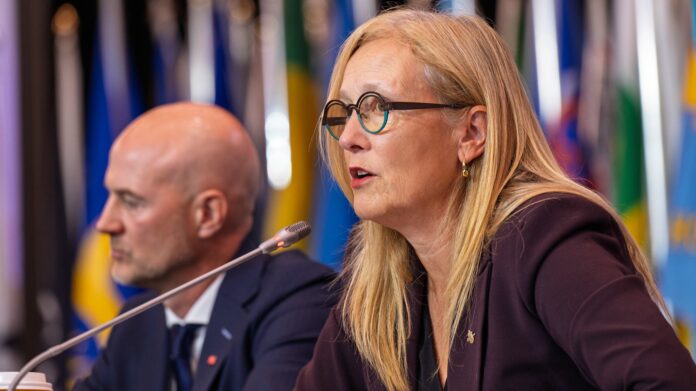B.C. Finance Minister Brenda Bailey said the province’s economy has remained steady despite global trade conflicts and rising costs.
Bailey spoke Tuesday at the Union of B.C. Municipalities convention in downtown Victoria, where local government leaders and other officials are gathering this week to discuss issues from the economy and affordable housing to infrastructure and health care.
Her comments come just over a week after she delivered the province’s first quarterly budget update for the fiscal year.
Her comments come just over a week after she delivered the province’s first quarterly budget update for the fiscal year.
“Our diverse economy is set up better than some of our colleagues’ economies to weather these headwinds,” Bailey said during a plenary session on B.C.’s economy. “But there’s no doubt that tariffs are challenging our economy and putting additional pressure on our fiscal position.”
Bailey noted real GDP growth is forecast at 1.5 per cent this year, which is slightly lower than expected in the initial budget.
She said the province expects B.C.’s economy to strengthen in the latter half of the decade, with an average annual GDP growth of 2.1 per cent 2027 to 2029.
Bailey also said even through B.C.’s unemployment rate has ticked up in recent months, it remains one of the lowest in Canada at 6.1 per cent.
“But uncertainty continues to slow economic growth, impacting investments and exports,” said Bailey. “And that’s why we need to be focused with our spending, making smart reductions where we can.”
Warren Lovely, managing director of economics and strategy at the National Bank of Canada, agreed that British Columbia’s economy is doing relatively well compared to the rest of Canada, considering the ongoing economic uncertainty.
But he said the situation is complex and demographics play a big part.
“I think we’re writing a new version of that famous book: boom, bust, and echo,” said Lovely.
He said we’re now in the “bust” stage, after a previous boom in immigration that Canada struggled to absorb, and we’ll be feeling the echoes for a while.
“What that means is that the previously breakneck pace of population growth has been crashing lower,” said Lovely.
Quarterly data released in June shows B.C.’s population declined by more than 2,300, while annual growth slowed sharply in the past year.
Lovely said that poses a major risk for forecasters.
“The ground is still shifting under our feet,” he said.
But Lovely said B.C. is better positioned than a lot of provinces to weather the current tariff storms amid Canada’s trade war with the U.S.
“Simply put, trade and exports are a smaller share of this provincial economy than you’ll see in a lot of other provinces,” said Lovely.
He noted Canada as a whole sends about 75 per cent of exports to the U.S, while in British Columbia, that’s closer to 50 per cent.
David Williams, vice-president of policy for the Business Council of B.C., said it’s concerning that most parts of the private sector are growing slower than the population.
“It sends a very negative signal to businesses about basing and building operations in the province, and it sends a very negative signal to…young people in general about whether they can build a life in the province.”” said Williams.
Tamara Vrooman, president and CEO of the Vancouver Airport Authority, said B.C. is outperforming other provinces but lags behind international peers.
“Our performance compared to international peers is like winning the turtle derby – we’re ahead, but we’re not exactly where we need to be,” said Vrooman.
She said the province needs a disciplined plan to attract business investment.
“We really need to be making sure we’re putting that ‘open for business’ sign on the front door,” said Vrooman.






